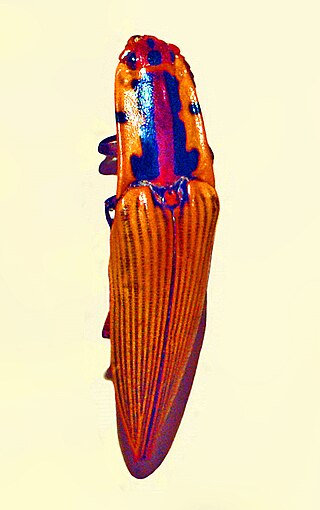Related Research Articles

Sarah Kirsch was a German poet.

Kirschwasser, or just Kirsch is a clear, colourless brandy from Germany, Switzerland and France, traditionally made from double distillation of morello cherries, a dark-coloured cultivar of the sour cherry. It is now also made from other kinds of cherries. The cherries are fermented completely, including their stones. Unlike cherry liqueurs and cherry brandies, Kirschwasser is not sweet. It is sometimes distilled from fermented cherry juice.

Kirsch-lès-Sierck is a commune in the Moselle department in Grand Est in north-eastern France.

Theodor Franz Wilhelm Kirsch was a German entomologist who specialised in Coleoptera.

Oedemerinae are a subfamily of the false blister beetles, also known as pollen-feeding beetles. The Nacerdinae are sometimes merged here.
Hylaeogena is a genus of beetles in the family Buprestidae, containing the following species:
Leiopleura is a genus of beetles in the family Buprestidae, containing the following species:

Semiotus is a genus of beetle belonging to the family Elateridae. It includes about 85 large sized (14–48 mm) and colourful click beetles with bright integument. The colouration is usually yellow with longitudinal black, orange or reddish stripes. The Neotropical genus occurs from Mexico to Argentina and Chile.

Nealcidion is a genus of beetles in the family Cerambycidae, containing the following species:

Johann Peter Kirsch was a Luxembourgish ecclesiastical historian and biblical archaeologist.
Forsteriini is a tribe of longhorn beetles of the subfamily Lamiinae.
Stenidea is a genus of longhorn beetles of the subfamily Lamiinae, containing the following species:
Falsamblesthis is a genus of longhorn beetles of the subfamily Lamiinae, containing the following species:
Falsamblesthis gracilis is a species of beetle in the family Cerambycidae. It was described by Lameere in 1893. It is known from Venezuela.
Falsamblesthis ibiyara is a species of beetle in the family Cerambycidae. It was described by Marinoni in 1978. It is known to be found in Brazil.
Falsamblesthis microps is a species of beetle in the family Cerambycidae. It was described by Martins and Galileo in 1992. It is known from Venezuela.
Falsamblesthis taeniata is a species of beetle in the family Cerambycidae. It was described by Belon in 1903. It is known from Bolivia.

Thomas Lee Kirsch II is an American attorney and jurist who has served as a judge of the United States Court of Appeals for the Seventh Circuit since December 2020. He was previously the United States attorney for the Northern District of Indiana from October 2017 to December 2020.

Asclerini is a tribe of false blister beetles in the family Oedemeridae. There are more than 40 genera and over 200 described species in Asclerini.

Exorides is a genus of broad-nosed weevils in the family Curculionidae, tribe Eustylini, distributed in northern South America.
References
- ↑ "Falsamblesthis seriepilosa (Kirsch, 1889)". BioLib. Retrieved 8 September 2014.